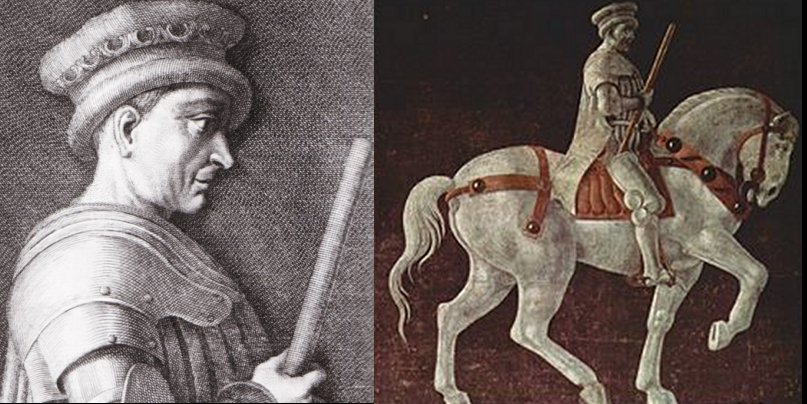John Hawkwood ‘John Sharp’: Feared, English Mercenary And His White Company In 14th Century Italy
A. Sutherland - AncientPages.com - John Hawkwood was widely known in Europe eight hundred years ago. He was an English military in the Hundred Years' War (1337 to 1453) and a mercenary operating in Italy, where he was known as Giovanni Acuto.
Hawkwood was born about 1320 in Sible Hedingham in Essex, England. His father was a leather tanner and landowner.
Left: Engraving representing John Hawkwood. Public Domain; Right: Funerary Monument to Sir John Hawkwood by Paolo Uccello (1436). Public Domain
The family was not wealthy, and when his father died, John inherited only a sack of wheat and 20 pounds. Such a legacy was not enough to make a career, so he searched for new opportunities to improve his life.
John Hawkwood – Knight And Leader Of The White Company
At that time, Edward III (1312–1377) was King of England, celebrated for his military successes and restoring royal authority after the devastating reign of his father, Edward II.
Edward III regularly needed new soldiers in the Hundred Years' War with France; John Hawkwood took this opportunity and found work as an archer in Edward's troops. He soon showed his skill on the battlefield.
After the Battle of Poitiers (1356), Hawkwood joined the White Company, an ill-famed group of mercenaries. With them, he entered Italy in 1361; only three years later, he became the company's commander. He was knighted, but it was never precisely specified when and by whom (though the Black Prince and the English King were suggested)
He Was A Leading Figure In Italian Warfare
Hawkwood was one of the leading figures in Italian warfare for the next thirty years. As the leader of the White Company, he specialized in archery and sneaky attacks.
After arriving in Italy, he fought for several factions, such as the Pope, Milan, and Florence. He served as a mercenary and was first the Pope and then various lords.
In his book 'Mercenaries and their Masters,' Michael Mallett writes that Hawkwood was "a tough, professional soldier who seemed to care less about money and more about military reputation than most of the other contemporary leaders. Much of his success is attributed to the advantages that his troops enjoyed. Still, there can be no doubt that he established unprecedented unity and loyalty in his company. He also acquired a reputation for fidelity and honesty, which was to some extent a reflection on the behavior of his rivals because Hawkwood was no paragon of virtue."
In Italy, his group was constantly moving. The Pope had been annoyed with the people of Milan because the city's prince had his mighty army, and in his opinion, he could practically do what he wanted. He was wrong.
These were times when different Italian cities remained in conflict. For example, Pisa rented John and his men to fight against Milan. Hawkwood's troops trounced him and his city. In the coming years, many of the members of the White Company died in all those more or less significant military encounters.
However, with time, John had established an excellent reputation as a commander and a formidable soldier. Many people were privileged to fight at his side. He paid them well and had no problems replacing those he lost in battles.
Hawkwood was a well-paid mercenary; he had money and knew how to make more money. For example, the city of Florence paid him 130,000 florins because it wanted to be in peace, and soon others did the same, and this clever mercenary became a rich man.
John Hawkwood's Career And 1377 Cesena Massacre
Hawkwood was responsible for the 1377 Cesena Massacre, where troops innocently killed 6,000 people under his command.
"…at Cesena in 1377, the papal mercenaries carried out massacres of the civilian populations which were to be permanent stains on the records of Italian warfare…. Cardinal Robert of Geneva, who at Cesena demanded the blood of the entire population in revenge for the murder of some of his mercenaries."
"Hawkwood is said to have obeyed Cardinal Robert's instructions with the greatest reluctance and saved some women in Cesena.
By this time, he had already been in Italy for fifteen years. He had developed a sympathy for the country and its inhabitants that the Breton mercenaries could scarcely be expected to share. However, in Cesena, more than 5,000 of the population were slaughtered, and the moats were filled with the bodies of those who tried to escape from the city..."
Hawkwood devoted himself to various diplomatic missions for the English King for the rest of his long life. He ended his career in Florence. He had always expected to return to England before he died, and he was just about to sell his possessions in Italy, but it never happened. He died in 1394 in Florence.
Updated on January 18, 2024
Written by – A. Sutherland - AncientPages.com Senior Staff Writer
Copyright © AncientPages.com All rights reserved. This material may not be published, broadcast, rewritten or redistributed in whole or part without the express written permission of AncientPages.com
Expand for referencesReferences:
Caferro W. John Hawkwood: An English Mercenary in Fourteenth-Century
Caferro W. Mercenary Companies and the Decline of Siena
More From Ancient Pages
-
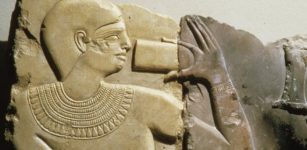 Mentuhotep II – The 11th Dynasty’s Pharaoh Who Reunited Egypt And Established The Middle Kingdom
Featured Stories | Oct 27, 2021
Mentuhotep II – The 11th Dynasty’s Pharaoh Who Reunited Egypt And Established The Middle Kingdom
Featured Stories | Oct 27, 2021 -
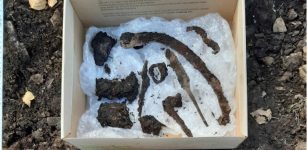 Viking Grave Discovered In The Middle Of Oslo, Norway
Archaeology | Dec 23, 2022
Viking Grave Discovered In The Middle Of Oslo, Norway
Archaeology | Dec 23, 2022 -
 Wonderful Long-Lived Nymphs In Greek And Roman Mythologies
Featured Stories | Mar 29, 2024
Wonderful Long-Lived Nymphs In Greek And Roman Mythologies
Featured Stories | Mar 29, 2024 -
 Mystery Of The Royal Tombs At Vergina Deepens – Has Alexander The Great’s Sacred Purple Tunic Been Found Inside?
Archaeology | Oct 28, 2024
Mystery Of The Royal Tombs At Vergina Deepens – Has Alexander The Great’s Sacred Purple Tunic Been Found Inside?
Archaeology | Oct 28, 2024 -
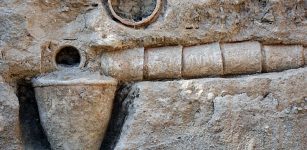 Ancient Aqueduct System Discovered In Boroujerd, Lorestan
News | Sep 16, 2015
Ancient Aqueduct System Discovered In Boroujerd, Lorestan
News | Sep 16, 2015 -
 Powerful Winds In Ancient Beliefs
Featured Stories | Feb 5, 2024
Powerful Winds In Ancient Beliefs
Featured Stories | Feb 5, 2024 -
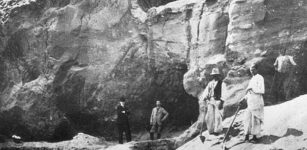 Neanderthals Decorated Their Caves With Rocks 130,000 Years Ago – Find At Krapina Site Reveals
Archaeology | Jan 19, 2017
Neanderthals Decorated Their Caves With Rocks 130,000 Years Ago – Find At Krapina Site Reveals
Archaeology | Jan 19, 2017 -
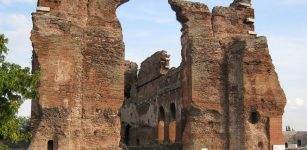 Pergamon – One Of ‘Seven Churches Of Asia’ With Great Library And Sophisticated Water Supply System
Civilizations | Jul 25, 2018
Pergamon – One Of ‘Seven Churches Of Asia’ With Great Library And Sophisticated Water Supply System
Civilizations | Jul 25, 2018 -
 Yakhchals: Ingenious Ancient ‘Refrigerators’ Could Store Ice In The Hot Desert
Ancient Technology | Sep 15, 2018
Yakhchals: Ingenious Ancient ‘Refrigerators’ Could Store Ice In The Hot Desert
Ancient Technology | Sep 15, 2018 -
 Fascinating Millennia Old Natufian Culture: Funerals With Flowers, Food And Pounding Sound Of Mortars
Civilizations | Aug 22, 2015
Fascinating Millennia Old Natufian Culture: Funerals With Flowers, Food And Pounding Sound Of Mortars
Civilizations | Aug 22, 2015 -
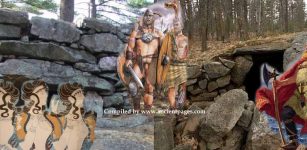 Riddle Of Mystery Hill: Who Built America’s Stonehenge?
Featured Stories | May 10, 2020
Riddle Of Mystery Hill: Who Built America’s Stonehenge?
Featured Stories | May 10, 2020 -
 Draugr – Vikings Feared This Ugly Living Dead With Prophetic Visions
Featured Stories | May 24, 2020
Draugr – Vikings Feared This Ugly Living Dead With Prophetic Visions
Featured Stories | May 24, 2020 -
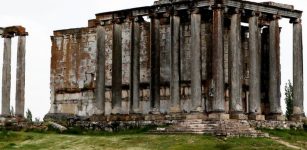 Ancient City Of Aizanoi: Statue Heads Of Greek Gods Unearthed In Excavations
Archaeology | Nov 23, 2021
Ancient City Of Aizanoi: Statue Heads Of Greek Gods Unearthed In Excavations
Archaeology | Nov 23, 2021 -
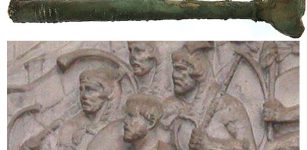 Vindolanda Treasures: Rare Roman Cornu Mouthpiece – Instrument of War – Uncovered
Archaeology | Sep 24, 2022
Vindolanda Treasures: Rare Roman Cornu Mouthpiece – Instrument of War – Uncovered
Archaeology | Sep 24, 2022 -
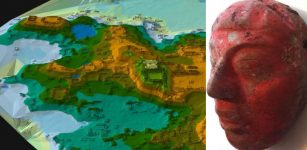 Ancient Tomb Of Maya Ruler Te’ Chan Ahk Discovered In Guatemala
News | Sep 14, 2017
Ancient Tomb Of Maya Ruler Te’ Chan Ahk Discovered In Guatemala
News | Sep 14, 2017 -
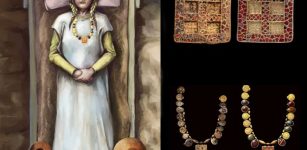 Mystery Of The Anglo-Saxon Harpole Burial Continues – New Clues
Archaeology | Dec 14, 2023
Mystery Of The Anglo-Saxon Harpole Burial Continues – New Clues
Archaeology | Dec 14, 2023 -
 Famous Philosopher Plato: One The Greatest Thinkers Of All Time And His Concept Of Soul
Featured Stories | Jun 25, 2018
Famous Philosopher Plato: One The Greatest Thinkers Of All Time And His Concept Of Soul
Featured Stories | Jun 25, 2018 -
 On This Day In History: Christiaan Huygens Discovers Saturn’s Largest Moon Titan – On Mar 25, 1655
News | Mar 25, 2017
On This Day In History: Christiaan Huygens Discovers Saturn’s Largest Moon Titan – On Mar 25, 1655
News | Mar 25, 2017 -
 Neanderthal Intelligence Revealed By Their Use Of Fire For Cooking
Archaeology | Oct 13, 2023
Neanderthal Intelligence Revealed By Their Use Of Fire For Cooking
Archaeology | Oct 13, 2023 -
 Oxygen Spike Coincided With Ancient Global Extinction
Archaeology | Sep 3, 2021
Oxygen Spike Coincided With Ancient Global Extinction
Archaeology | Sep 3, 2021

